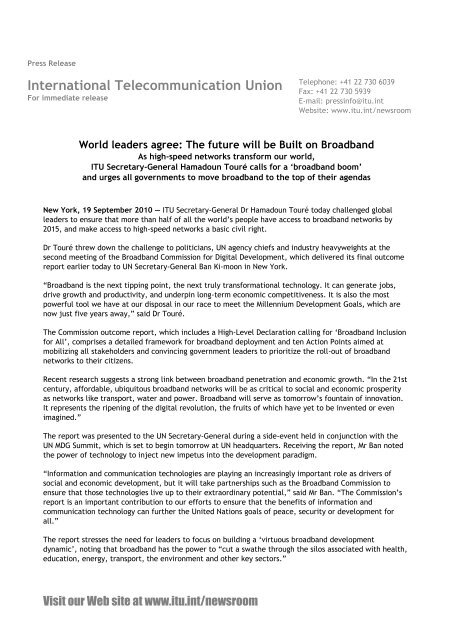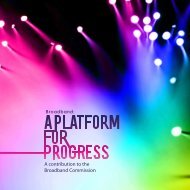International Telecommunication Union - Paul Budde Communication
International Telecommunication Union - Paul Budde Communication
International Telecommunication Union - Paul Budde Communication
You also want an ePaper? Increase the reach of your titles
YUMPU automatically turns print PDFs into web optimized ePapers that Google loves.
Press Release<br />
<strong>International</strong> <strong>Telecommunication</strong> <strong>Union</strong><br />
For immediate release<br />
Telephone: +41 22 730 6039<br />
Fax: +41 22 730 5939<br />
E-mail: pressinfo@itu.int<br />
Website: www.itu.int/newsroom<br />
World leaders agree: The future will be Built on Broadband<br />
As high-speed networks transform our world,<br />
ITU Secretary-General Hamadoun Touré calls for a ‘broadband boom’<br />
and urges all governments to move broadband to the top of their agendas<br />
New York, 19 September 2010 — ITU Secretary-General Dr Hamadoun Touré today challenged global<br />
leaders to ensure that more than half of all the world‟s people have access to broadband networks by<br />
2015, and make access to high-speed networks a basic civil right.<br />
Dr Touré threw down the challenge to politicians, UN agency chiefs and industry heavyweights at the<br />
second meeting of the Broadband Commission for Digital Development, which delivered its final outcome<br />
report earlier today to UN Secretary-General Ban Ki-moon in New York.<br />
“Broadband is the next tipping point, the next truly transformational technology. It can generate jobs,<br />
drive growth and productivity, and underpin long-term economic competitiveness. It is also the most<br />
powerful tool we have at our disposal in our race to meet the Millennium Development Goals, which are<br />
now just five years away,” said Dr Touré.<br />
The Commission outcome report, which includes a High-Level Declaration calling for „Broadband Inclusion<br />
for All‟, comprises a detailed framework for broadband deployment and ten Action Points aimed at<br />
mobilizing all stakeholders and convincing government leaders to prioritize the roll-out of broadband<br />
networks to their citizens.<br />
Recent research suggests a strong link between broadband penetration and economic growth. “In the 21st<br />
century, affordable, ubiquitous broadband networks will be as critical to social and economic prosperity<br />
as networks like transport, water and power. Broadband will serve as tomorrow‟s fountain of innovation.<br />
It represents the ripening of the digital revolution, the fruits of which have yet to be invented or even<br />
imagined.”<br />
The report was presented to the UN Secretary-General during a side-event held in conjunction with the<br />
UN MDG Summit, which is set to begin tomorrow at UN headquarters. Receiving the report, Mr Ban noted<br />
the power of technology to inject new impetus into the development paradigm.<br />
“Information and communication technologies are playing an increasingly important role as drivers of<br />
social and economic development, but it will take partnerships such as the Broadband Commission to<br />
ensure that those technologies live up to their extraordinary potential,” said Mr Ban. “The Commission‟s<br />
report is an important contribution to our efforts to ensure that the benefits of information and<br />
communication technology can further the United Nations goals of peace, security or development for<br />
all.”<br />
The report stresses the need for leaders to focus on building a „virtuous broadband development<br />
dynamic‟, noting that broadband has the power to “cut a swathe through the silos associated with health,<br />
education, energy, transport, the environment and other key sectors.”<br />
Visit our Web site at www.itu.int/newsroom
It also asks: “What price will be paid in the brave new world of digital opportunity by those who fail to<br />
embrace broadband inclusion for their citizens?” – a stark warning in light of huge disparities in broadband<br />
affordability worldwide, which means that those who can least afford it pay the most for access, relative<br />
to average national monthly income.<br />
While subscribers in the developed world – for example the UK, US, Canada or Australia – pay under 1% of<br />
average national monthly income for a fast broadband connection, in many of the world‟s UN-designated<br />
Least Developed Countries, such as Ethiopia, Malawi or Niger, even a relatively slow broadband<br />
connection costs many times an average monthly salary.<br />
Affordability has a clear and direct correlation to take-up, so that while around 30% of people in the<br />
highly „wired‟ countries of Western Europe, Oceania and North America have a broadband subscription, in<br />
BRIC countries penetration is modest at around 10%, and in the world‟s poorest nations broadband reaches<br />
less than 1% of the population.<br />
The Commission outcome report stresses the importance of promoting cultural diversity and<br />
multilingualism in the online world. It urges governments not to limit market entry nor tax broadband and<br />
related services too heavily, and to ensure ample availability of spectrum to support mobile broadband<br />
growth. ITU forecasts a total of 900 million broadband subscribers by 2010 – and predicts that mobile<br />
broadband will be the access technology of choice for millions in the developing world, where fixed link<br />
infrastructure is sparse and expensive to deploy.<br />
“The new realities and opportunities for digital development must be firmly fixed in the minds of world<br />
leaders as a leadership imperative,” says the report, urging leaders to replicate the „mobile miracle‟ of<br />
the first decade of the 21 st century in a „broadband boom‟ that will created shared high-speed resources<br />
accessible and beneficial to all.<br />
A multimedia news release comprising broadcast quality footage and images from the meeting can be<br />
downloaded at: http://video360.world-television.com/ITU/<br />
Photos can be downloaded at: www.flickr.com/photos/itupictures/sets/72157624908644814/<br />
The outcome report of the Broadband Commission for Digital Development can be downloaded at:<br />
www.broadbandcommission.org/report1.pdf<br />
An Executive Summary of a contribution document prepared for the meeting detailing strategies for<br />
broadband roll-out can be downloaded at: www.broadbandcommission.org/report2.pdf<br />
A selection of quotes from the meeting can be viewed at:<br />
www.broadbandcommission.org/media/19sept2009/quotes.html<br />
High-resolution images of the Broadband Commission campaign and campaign animations can be<br />
downloaded at: www.broadbandcommission.org/b_more.html<br />
A full list of Commissioners can be found on the Broadband Commission website at:<br />
www.broadbandcommission.org/commissioners.html<br />
For more information, please contact:<br />
Sarah Parkes<br />
Senior Media Relations Officer, ITU<br />
Tel: +41 22 730 6135<br />
Mobile: +41 79 599 1439<br />
E-mail: pressinfo@itu.int<br />
Toby Johnson<br />
Senior <strong>Communication</strong>s Officer, ITU<br />
Tel: +41 22 730 5877<br />
Mobile: +41 79 249 4868<br />
E-mail : pressinfo@itu.int<br />
PAGE 2 OF 3
About ITU<br />
ITU is the leading United Nations agency for information and communication technology issues, and the<br />
global focal point for governments and the private sector in developing networks and services. For 145<br />
years, ITU has coordinated the shared global use of the radio spectrum, promoted international<br />
cooperation in assigning satellite orbits, worked to improve telecommunication infrastructure in the<br />
developing world, established the worldwide standards that foster seamless interconnection of a vast<br />
range of communications systems and addressed the global challenges of our times, such as mitigating the<br />
impact of natural disasters and climate change and strengthening cybersecurity.<br />
ITU also organizes worldwide and regional exhibitions and forums, such as ITU TELECOM WORLD, bringing<br />
together the most influential representatives of government and the telecommunications and ICT industry<br />
to exchange ideas, knowledge and technology for the benefit of the global community, and in particular<br />
the developing world.<br />
From broadband Internet to latest-generation wireless technologies, from aeronautical and maritime<br />
navigation to radio astronomy and satellite-based meteorology, from convergence in fixed-mobile phone,<br />
Internet access, data, voice and TV broadcasting to next-generation networks, ITU is committed to<br />
connecting the world.<br />
About the Broadband Commission for Digital Development<br />
The Broadband Commission for Digital Development is a top-level group of international experts<br />
comprising leading figures from a range of industry and public sectors. It is co-chaired by President <strong>Paul</strong><br />
Kagame of Rwanda, and Mr Carlos Slim, Honorary Chairman of the Carso Foundation and recently named<br />
by Forbes magazine as the world‟s wealthiest man.<br />
Its formation in May 2010 was driven by a passionate belief in the power of broadband improve our world.<br />
The Commission‟s mission is to promote the adoption of broadband-friendly practices and policies so that<br />
the entire world can take advantage of the benefits broadband can offer.<br />
More specifically, the Broadband Commission seeks to demonstrate that broadband networks:<br />
<br />
<br />
<br />
<br />
have the same level of importance as roads and electricity networks; they are basic infrastructure<br />
in a modern society;<br />
are uniquely powerful tools for achieving the Millennium Development Goals (MDGs);<br />
are remarkably cost-effective and offer an impressive return-on-investment (ROI) for both<br />
developed and developing economies;<br />
underpin all industrial sectors and increasingly are the foundation of public services and social<br />
progress.<br />
www.broadbandcommission.org<br />
PAGE 3 OF 3



